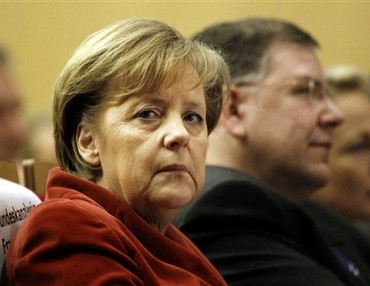Blog by Kateryna Zarembo, analyst of the Institute of World Policy for KyivPostweek ago, the BRIC countries (Brazil, Russia, India and China) have shown that they can have allies among the developed democratic world leaders.
The countries who abstained from voting on UN Security Council Resolution 1973 concerning the establishment of a no-flight zone over Libya were the mentioned states and… Germany.
While the decision of Russia, China, Brazil and India did not become make great resonance, Germany’s abstention was a surprise even Deputy Foreign Minister of Libya Khaled Kaim. What was a reason for such decision?
In principle, Germany, represented by Chancellor Angela Merkel and Foreign Minister Guido Westerwelle, sincerely supports the goal of resolution. They are even ready to fight. But not in the Libyan airspace. Instead, Germany will eagery take on more missions in Afghanistan to free resources for allies in the fight against Gaddafi.
Westerwelle himself explains this decision by the “dangers and risks” of the project. In other words, the German Foreign Ministry does not believe that the war will end quickly. Moreover, the involved parties cannot agree on the expected outcome of military intervention parties, while the UNSC Resolution has no clearly defined ultimate goal either.
Even the countries who take part in the operation lack consensus on the expected results and sincerity of the partners: on Wednesday President of Turkey Abdullah Gul hinted that the leaders of some countries use the operation to their own benefit.
Probably the anti-war syndrome of Germany has to do with the non-intervention decision. German population and even the military had put the politicians under heavy pressure for the German participation in the Afghanistan war. Engagement into another trouble spot would hardly be a wise decision. But is sending more troops to the war which is not supported by 79% of the population wiser?
Some analysts also suggest that other countries have influence Germany’s abstination. For example, Israel – according to Eckart Stratenschulte, Professor of the European Academy Berlin. The only democracy in the Middle East, Israel prefers stability, rather than democracy in the region. Professor Stratenschulte did not rule out that Israel’s restraint about the conflict had to do with the German cautious stance.
And finally, let’s nit forget who else, alongside Germany, sits on the fence, not supporting the Resolution, but not vetoing it, either. Especially in the context of building a “new European security architecture”.
Last year Germany made great efforts to involve Russia in the European security space in return for solving the conflict in Transnistria. Voting in favor of Resolution 1973 would mean that Russia and its Western partners would again find themselves on different banks. This again would testify that a common security space in Europe is possible only in words.
Obviously, Merkel would be loath to quarrel with France, which plays the first fiddle in operations in Libya, over Russia – and Nicolas Sarkozy was not too happy about the German abstination. But is it not a short-term tactical move for the sake of the long-term outcome?
When passions die away, and popular discontent with the war will grow, Germany could find itself as a state, which would solve one of the old “frozen” conflicts right at the EU border without sacrificing a signle human life. Such success is worth some temporary tensions with colleagues.




Comments theme
Comments themeComments themeComments themeComments themeComments themeComments themeComments themeComments themeComments themeComments themeComments themeComments themeComments themeComments themeComments themeComments themeComments themeComments themeComments themeComments.